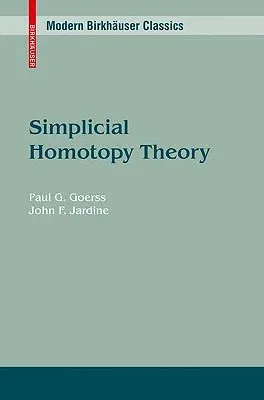Since the beginning of the modern era of algebraic topology, simplicial
methods have been used systematically and effectively for both
computation and basic theory. With the development of Quillen's concept
of a closed model category and, in particular, a simplicial model
category, this collection of methods has become the primary way to
describe non-abelian homological algebra and to address
homotopy-theoretical issues in a variety of fields, including algebraic
K-theory. This book supplies a modern exposition of these ideas,
emphasizing model category theoretical techniques.
Discussed here are the homotopy theory of simplicial sets, and other
basic topics such as simplicial groups, Postnikov towers, and
bisimplicial sets. The more advanced material includes homotopy limits
and colimits, localization with respect to a map and with respect to a
homology theory, cosimplicial spaces, and homotopy coherence.
Interspersed throughout are many results and ideas well-known to
experts, but uncollected in the literature.
Intended for second-year graduate students and beyond, this book
introduces many of the basic tools of modern homotopy theory. An
extensive background in topology is not assumed.
Reviews:
"... a book filling an obvious gap in the literature and the authors
have done an excellent job on it. No monograph or expository paper has
been published on this topic in the last twenty-eight years." -
Analele Universitatii din Timisoara
"... is clearly presented and a brief summary preceding every chapter
is useful to the reader. The book should prove enlightening to a broad
range of readers including prospective students and researchers who want
to apply simplicial techniques for whatever reason." - Zentralblatt
MATH
"... they succeed. The book is an excellent account of simplicial
homotopy theory from a modern point of view [...] The book is well
written. [...] The book can be highly recommended to anybody who wants
to learn and to apply simplicial techniques and/or the theory of
(simplicial) closed model categories." - Mathematical Reviews


